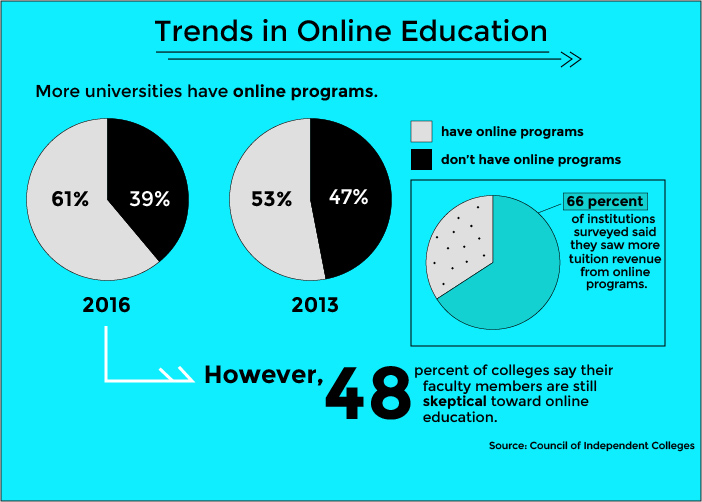
In the past three years, more private colleges and universities have begun expanding and increasing their number of online degree programs, according to a study published by The Learning House, Inc. on Monday.
The study, conducted by The Learning House, Inc. and The Council of Independent Colleges, surveyed 169 officers at private higher education institutions across the country.
The study found the number of fully online programs has increased at private institutions — nearly half of the private colleges surveyed offer at least one online program.
“It should come as no surprise that online learning has continued to expand its footprint,” the study stated. “No matter the modality, students are starting to expect flexibility to not just be an option, but the norm in their educational experience.”
Another key finding of the study is that tuition revenue from online courses has increased 3 percent since 2013, with more than one quarter of the colleges surveyed making more than $1 million in revenue from online programs, according to the study’s key findings.
Boston University Distance Education Director Eric Friedman said the university is successful with online degree programs because of its strategy to work directly with faculty in individual schools to develop online programs and courses.
“This conservative and strategic approach is definitely a solid one because it’s not about just getting more enrollment and more tuition,” Friedman said. “The strategy is more about wanting to broaden BU’s reach.”
Friedman said although BU’s online graduate degree programs have been successful, he does not expect any expansion of undergraduate or bachelor’s degree programs because the “undergraduate education is still relatively sacred as a face-to-face approach.”
Several students said they see many benefits of online education, but they would rather take their classes on campus.
Emily Scott, a freshman in the College of Arts and Sciences, said she has taken some online classes to fulfill course requirements, but she would not want to do a whole degree program online.
“I’m sure an online program would help someone abroad who wanted to come to BU, but I wouldn’t like taking all of my classes online and missing the face-to-face interaction of being on campus,” she said.
Others said they would take online classes because it would allow students to learn on their own time.
Julie Ericson, a freshman in CAS, said she would try an online degree program.
“Online education is good because it helps those who probably have a busy schedule, and don’t have time to come into class every day,” she said.
Andrew Amanda Leigh-Bullard, a first-year graduate student in the School of Theology, said that in their experience, online education can be beneficial for certain people, but they value the in-class experience.
“It really depends on the style of the student as well as the individual needs,” Leigh-Bullard said. “I did my first graduate program online as someone who’s coming straight from a traditional undergraduate program, and I really missed the classrooms. I found it harder to get to know my peers.”














